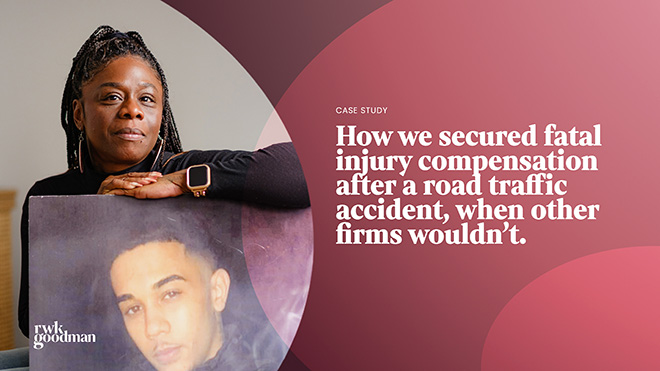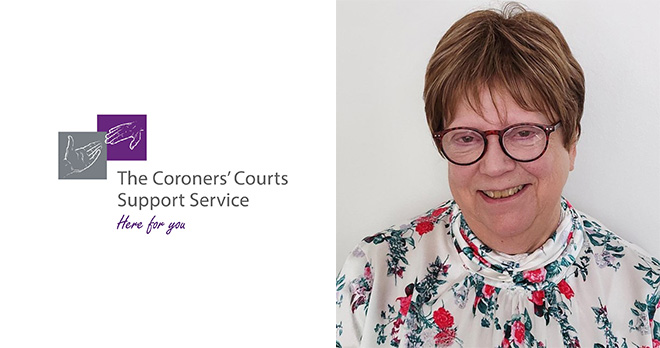Fatal accident claims: what you need to know.

Where a death occurs as a result of another party’s negligence, specialist solicitors can provide advice regarding a possible compensation claim.
Claims for deaths on the road and in the workplace are commonly brought, as well as claims for deaths occurring as a result of medical negligence.
Whatever the circumstances of the death, if you believe that someone else’s negligent action (or inaction) was to blame, your first step should be to contact a specialist fatal accident solicitor to seek their thoughts on any available remedies, including a claim for compensation.
Who can bring a fatal accident claim?
Only one claim can be brought following a fatal accident and it must cover all eligible dependants’ entitlement to compensation. Therefore it should not be too much of a concern who is bringing the claim, so long as an appropriate person is happy to lead the process. Your solicitors will work with the person leading the claim to ensure that it covers all parties’ entitlement to compensation.
Most appropriate person to lead the claim – where there is a Will.
If the deceased had a Will then it will usually be the executor/s appointed in the Will who will bring the fatal accident claim.
If the executors do not initiate a claim within six months of the death, any eligible dependant can initiate the claim. This should be a matter of last resort, as it will limit what can be claimed in a global sense, if the person leading the claim has no entitlement to deal with claims on behalf of the deceased’s estate. This entitlement comes from being appointed as executor via a Will, or by being appointed administrator if there is no Will.
If the executor/s decline to bring a claim, you may wish to involve specialist solicitors who can find out what the barriers are and recommend what should be done next to get the claims process started.
Most appropriate person to lead the claim – where there is no Will.
If there is no Will then someone will need to apply to be appointed administrator of the deceased’s estate. This will enable them to deal with the part of the compensation claim which covers the losses to the deceased’s estate such as funeral costs (if incurred by the estate) and any claim for pain, suffering and loss of amenity suffered by the deceased. In some cases, this compensation can form a significant part of the total compensation received.
Where there is no Will, the ‘most entitled’ person should generally be the person who applies to become administrator of the deceased’s estate. Gov.uk has an ‘inheritance’ calculator which can help you to work out who this is (usually the surviving spouse if there is one, then children and other descendants, parents, siblings and so on).
If the most entitled person does not wish to apply to be appointed administrator of the deceased’s estate, another ‘lesser entitled’ person may apply. This is provided the ‘lesser entitled’ person can evidence why they are most suitable to be appointed administrator in the circumstances. Your solicitor can assist with the application to be appointed administrator where the background to the application requires a little more explanation.
It is important to note that solicitors will be happy to speak to anyone who would like to investigate obtaining compensation following their loved one’s death – even if the advice is that another individual would be better placed to lead the claim on a day-to-day basis (such as an executor appointed under a Will or a person with better entitlement to be appointed administrator).
Should it be the case that there was no Will, the claim can be initiated alongside putting the application to be appointed administrator in hand, so there is no need to delay in contacting solicitors.
How do I know if I have a wrongful death claim?
If you believe your loved one’s death to have been caused by another party’s negligence, it would be sensible to discuss this with a solicitor to obtain their advice regarding a claim for compensation.
Their death may have triggered a Police, HSE or CQC investigation, or it may have triggered an internal investigation within the organisation you consider to have been at fault. Information learnt from these investigations could assist to understand whether you are likely to have a successful claim.
Compensation can provide families with an important lifeline following a sudden, tragic event. It is recommended that you consult with specialist fatal solicitors to understand whether or not you are likely to have a claim. Even if investigations into the death are ongoing, fatal solicitors are likely to have a good idea of the prospects of success and can advise on the key liability aspects.
What is the bereavement award for fatal accidents?
The ‘bereavement award’ is a sum of compensation which is paid to eligible persons following a death that has arisen as a result of negligence. At present, the bereavement award in England and Wales is £15,120. This sum can only be paid to eligible persons and must be shared equally if there is more than one eligible person (e.g. two eligible parents).
Who is entitled to bereavement damages?
The list of persons eligible to claim the bereavement award is set out in the Fatal Accidents Act.
The Act specifies that an award of £15,120 is payable to:
a) the wife or husband [or civil partner] of the deceased;
b) the cohabiting partner of the deceased; and
Where the deceased was a minor who was never married [or in a civil partnership], the bereavement award is payable to:
i. his parents, if he was legitimate; and
ii. his mother, if he was illegitimate.
Where the law refers to a “Cohabiting partner”, this means any person who:
a) was living with the deceased in the same household immediately before the date of the death; and
b) had been living with the deceased in the same household for at least two years before that date; and
c) was living during the whole of that period as the wife or husband or civil partner of the deceased.
The award can only be claimed by a person who is eligible under the Act. Specialist solicitors will be able to advise on eligibility in individual cases.
Does personal injury cover death?
Fatal accident claims (for example, following a road traffic accident or accident at work) are a type of personal injury claim. However they differ slightly in that there are different routes to claiming the compensation. The types of losses claimed will differ from other injury claims, as well as being quantified differently.
Personal injury solicitors may specialise in both injury and fatal claims, although the approach to quantifying fatal claims is distinct and requires specialist expertise. If a person survived their injuries for a period before their death occurred, the fatal accident claim will comprise compensation for the period they survived, as well as for the losses arising as a result of their death, within the same claim.
Compensation for emotional distress.
At present, UK law provides limited access to compensation for the pain and suffering caused to individuals who have lost a loved one due to negligence.
Such compensation is provided by way of a statutory ‘Bereavement Award’ which (since May 2020) is a fixed sum of £15,120, payable to those falling within a specified list of eligible persons. Where more than one person is eligible, the award must be shared equally between them.
In certain situations (such as where a spouse has been lost, or a child has lost their parent) the court may allow a small amount of additional compensation for the loss of the deceased’s love and affection.
The bulk of compensation in fatal claims typically arises from the aspects of the claim dealing with loss of dependency on finance or services, rather than for emotional distress.
An exception to the standard position is where the individual/s left behind have their own injury claim as a primary or secondary victim. In the event that you have your own claim, psychological injury can be compensated for as part of this. If you were also involved in the accident or were closely involved in the immediate aftermath, you should discuss with a specialist solicitor whether you might have a claim that can be brought alongside and in addition to, the fatal accident claim.
The damages you may be eligible for under the Fatal Accidents Act.
Where applicable, dependants of the deceased can claim the following damages under the Fatal Accidents Act 1976:
- bereavement damages – a statutory sum of £15,120 payable to eligible persons;
- funeral expenses – if paid by dependants of the deceased rather than from the deceased’s estate;
- loss of financial dependency on the deceased (such as loss of income);
- loss of dependency on services provided by the deceased (such as childcare, cooking, cleaning, gardening, DIY etc);
- loss of any gifts that the deceased would have continued to give on birthdays, at Christmas and on any other special occasions such as when their child goes to university, gets married or has a child.
Fatal accident claims will usually include further damages, claimed under the Law Reform (Miscellaneous Provisions) Act 1934. This Act deals with claims on behalf of the deceased’s estate.
Damages which can be claimed under the Law Reform (Miscellaneous Provisions) Act 1934 include:
- pain, suffering and loss of amenity (PSLA) – a claim for the pain and suffering the deceased experienced following the accident, prior to their death;
- special damages – covering any losses incurred prior to the deceased’s death, such as loss of earnings, private treatment costs and a gratuitous care claim for loved ones who provided care & support following the accident. The deceased’s personal effects might have also been damaged. A claim can be included for those items which were damaged; and
- funeral experiences – if paid from their estate.
Who can claim for loss of dependency?
The Fatal Accidents Act 1976 provides a list of persons who are eligible to claim for loss of dependency on the deceased.
Claimants need to establish:
- that they fall within the statutory definition of a qualifying ‘dependant’ under the Act; and
- that they had an existing dependency on the deceased for financial support or services or that they had reasonable expectation of benefit in the future.
Most people would be surprised at what constitutes dependency. It would be sensible to discuss this with a solicitor who can also advise who would be eligible to be included within the dependency claim.
Calculating fatal accident dependency.
Each claim is very different as it is based upon the relationships that your loved one had with those around them, their past behaviour and what they had indicated that they would have gone on to do in the future if the accident had not happened. Fatal accident dependency claims are worked out in conversation with the family of the deceased and vary significantly from case to case.
The compensation awarded for loss of dependency on the deceased can be substantial, particularly if the deceased contributed to household income and/or jobs around the home.
By way of example, if a married man is killed in a road traffic accident aged 40, the wife who survives him will be entitled to claim her reliance upon his income for the remainder of her life expectancy, which may be for another 40+ years.
The deceased’s wife will also be entitled to claim for the cost of replacement ‘services’ at a commercial rate for the remainder of the period that she would have otherwise relied upon her husband for these services e.g. if he undertook all of the gardening then she would recover the cost of paying a commercial gardener to perform these services in his place. In this example, if the husband would have carried on gardening until he was 70, there would be a 30-year claim for commercial gardening services.
Even where the deceased was not in a relationship, they might have helped family with food shopping, DIY, taking care of pets or any other such task which could attract a significant compensation award when calculated over a lengthy period.
How much compensation do you get for the death of a child?
The best way to understand the likely value of a claim from an early stage is to consult a specialist fatal accident solicitor who can provide this advice free of charge in the process of advising as to whether they could assist with a claim on a ‘no win, no fee’ basis.
For children under the age of 18, parents will receive the statutory bereavement award of £15,120. Other losses, such as funeral costs, will be claimed as well as anything else that solicitors identify as recoverable via the claim.
Unfortunately, claims for single, unmarried children over the age of 18, who don’t have any children of their own, tend to be lower in value because there is unlikely to be anyone eligible to claim the bereavement award. Further, the ‘dependency’ aspect of the claim is low owing to a lack of reliance on the child’s income or services at that particular stage of their life.
It is likely to be worth having a chat with specialist fatal accident solicitors in any event because even if the damages are not significant, the claim in that scenario should be simple to set out and at a minimum, funeral costs should be reimbursed, relieving some of the financial pressure for those left behind.
How long does it take to settle a death claim?
As with any claim, numerous variables are likely to affect the timescales for achieving settlement. Specialist fatal accident solicitors will do their best to estimate timescales from the outset, if this is of particular concern. The more complex the accident circumstances, the more likely that the outcome of any police, HSE, CQC or other investigation will be relevant to the Defendant insurer’s liability investigations, delaying their response whilst this investigation is ongoing.
Whilst awaiting the paying party’s response on liability, fatal accident solicitors will work with you to quantify the claim so that it is ready for settlement upon conclusion of the insurer’s investigations.
It would be sensible to assume that the claim will take at least 12 months to reach conclusion. This may be shorter or longer in the particular circumstances of the case.
Specialist fatal accident solicitors may be able to obtain an interim payment from the insurer (partial, early payment of the final settlement award) where funds are required ahead of the claim being settled in full.
What deaths will require an inquest?
The coroner will be notified of any deaths which are ‘violent or unnatural.’ As such, most deaths on the road will be referred to the coroner. There are other situations in which a coroner will become involved such as where the death occurred in police custody, prison or state detention or where the death occurred in circumstances that may require investigation (e.g. a medical setting where a particular decision might be under scrutiny).
Inquests are a fact finding investigation to establish the answer to four questions; the name of the deceased, the place of their death, the time of their death and how the death occurred. The coroner’s job is not to establish guilt or blame.
An inquest will be opened once the coroner is notified of the death. If there is a police (or other) investigation ongoing, the inquest may be ‘stayed’, pending the outcome of that investigation. Where another investigation, such as a criminal prosecution, resolves the coroner’s questions, the coroner will not duplicate investigations and will simply ‘adopt’ the findings of the criminal court without the need to invite the family to a full inquest hearing. This is most likely to happen in road traffic cases, where criminal investigation is required to determine whether the suspect identified by police, caused the death.
Inquest solicitors can advise families on how the coronial system operates, as well as supporting them through the inquest process, taking account of individual wishes and desired outcomes.
If you’ve lost someone close to you as a result of an accident, we can help you determine whether you have a claim.
Call now










